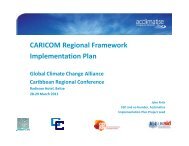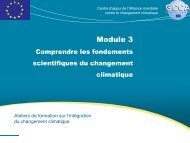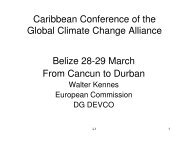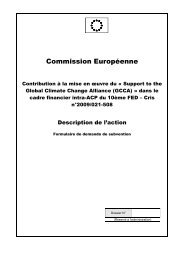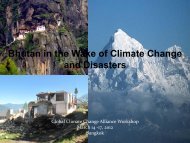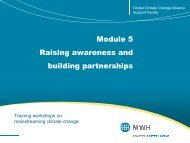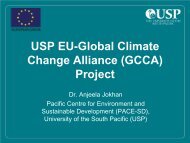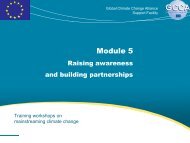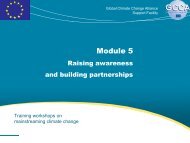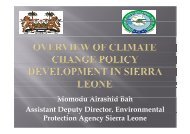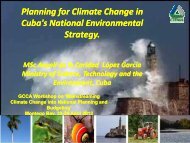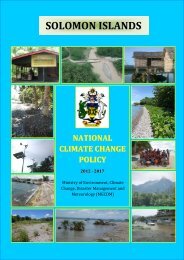Rwanda Green Growth Strategy 18nov11 - Global Climate Change ...
Rwanda Green Growth Strategy 18nov11 - Global Climate Change ...
Rwanda Green Growth Strategy 18nov11 - Global Climate Change ...
You also want an ePaper? Increase the reach of your titles
YUMPU automatically turns print PDFs into web optimized ePapers that Google loves.
Detailed Programmes of ActionProgramme 7: <strong>Green</strong> Industry and Private Sector DevelopmentResponsible Stakeholders (lead in bold)MINICOM, <strong>Rwanda</strong> Development Board (RDB), MININFRA, RNRA, MINIRENA, NLC, OGMR, REMA,MINAGRI, PSF, UNIDO-UNEP, World Bank GroupSummary of Programmes and Actions<strong>Rwanda</strong> is actively improving its investment climate by improving start-up and operating conditions forbusiness and industry, addressing water and energy requirements, and establishing special economic zones(SEZs) to attract foreign investment. Resource efficient and clean production has been introduced toindustry in <strong>Rwanda</strong> and needs to be scaled up to improve energy and water efficiency, thus reducingemissions and promoting resilience. SEZs should employ energy efficient technologies, water recycling andwaste management systems, and low carbon building design. <strong>Climate</strong> innovation centres (CICs) canpromote win-win scenarios by supporting investment in industries producing green technologies and thoseadopting green technology. infoDev has proposed setting up a CIC in Kigali. Support for the private sector isneeded to reduce industry emissions and build a local renewable energy sector. Action 1: Resource Efficient IndustriesThe <strong>Rwanda</strong> Resource Efficient and Cleaner Production Centre (RRECPC) is a joint project of the Ministry ofTrade and Industry (MINICOM) and UNIDO-UNEP housed in the Private Sector Federation. Resourceefficiency and cleaner production methods can reduce business risk, directly translate into cost savings, andcould promote sector growth. To build efficient industries, <strong>Rwanda</strong> will establish a framework for reportingenergy and water use, setting energy intensity targets, investigating differentiated electricity tariffs thatpromote off-peak use, and developing guidelines, standards and support for clean production. Action 2: <strong>Green</strong>ing the Special Economic Zone and provincial industrial parks<strong>Rwanda</strong> is establishing a Special Economic Zone (SEZ), a world-class business and industrial park in Kigali,to attract foreign direct investment. It is also implementing provincial industrial parks in other urban centres.It is timely that a green approach is considered in preparation of the SEZ and industrial parks to encourageenergy and water efficiency; green site preparation, industrial and building design; and to investigate wastetreatment options. <strong>Rwanda</strong> will implement a green SEZ to realise ‘triple-win’ opportunities: cost savings inproduction and operation, environmental benefits, and climate resilience. These opportunities will helppromote investment in the site, incentivise good practice, and attract key industries that will support<strong>Rwanda</strong>’s development of a low carbon green economy. Action 3: Promoting <strong>Green</strong> Technologies<strong>Climate</strong> Innovation Centres assist developing countries to accelerate the deployment of low carbon andadaptive technologies, companies and industries. They link green small- and medium- enterprises (SMEs)with support organisations, incubators, centres of excellence, and multilateral programmes; identifyinstitutional and capacity gaps; and explore early stage climate finance opportunities. By hosting a <strong>Climate</strong>Innovation Centre within the SEZ, <strong>Rwanda</strong> will benefit from the advisory and support services provided.Beyond these services, technology transfer is crucial to low carbon industrial growth. The government willwork with the UNEP-Risoe Technology Transfer Programme to identify priority sectors and technologiesspecific to <strong>Rwanda</strong>. The Private Sector Federation will also promote green technology industries byestablishing SME and private sector support programmes for technology awareness. Action 4: Building Carbon Trading CapacityThe Clean Development Mechanism and voluntary carbon markets offer innovative funding opportunities forthe private sector in renewable energy, energy efficiency, low carbon building and transport, forestry, andorganic waste management. To fulfill the highly technical requirements, <strong>Rwanda</strong> will establish a trainingprogramme for the private sector, linked to the CIC, on project design, baseline calculations, carbonaccounting, and monitoring, reporting and verification.68Government of <strong>Rwanda</strong>



